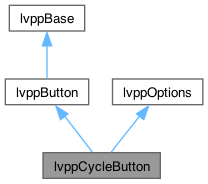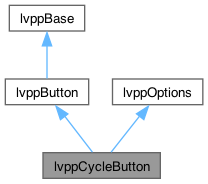|
| | lvppCycleButton (const char *fName, lv_obj_t *parent=nullptr) |
| | Construct a new lvpp Cycle Button object.
|
| |
| void | clearOptions (void) |
| | Remove all options from the current options list.
|
| |
| void | setOptions (const char *pOption) |
| | Add button options using a single char* with options separated by \n
|
| |
| void | setOptions (std::vector< std::string > &inOptions) |
| | Add button options using a vector of strings.
|
| |
| uint16_t | getSelectedIndex () |
| | Get the Current Index of which option is the active label on the button.
|
| |
| const char * | getSelectedText () |
| | Get the Current Text of the button label.
|
| |
| void | internalOnClicked () |
| | Internal version of the onClicked() callback which is used for other derived internal objects in the library.
|
| |
| | lvppButton (const char *fName, const char *pText=nullptr, lv_obj_t *parent=nullptr) |
| | Construct a new lvpp Button object.
|
| |
| | lvppBase (const char *fName, const char *oType) |
| | Construct a new lvpp Base object.
|
| |
| | ~lvppBase () |
| |
| void | createObj (lv_obj_t *o) |
| | Create the handlers and store the newly created object.
|
| |
| lv_obj_t * | getObj (void) |
| | Get the Obj object.
|
| |
| lv_obj_t * | getLabelObj (void) |
| | Get the label object.
|
| |
| virtual void | setSize (lv_coord_t width, lv_coord_t height) |
| | Set the Size object. Most of the time, LVGL does a great job of setting a sane size, but manipulation of things like the text or the font size can cause this to no longer be a good size. It is a common use pattern to instantiate a widget and then use setSize() and align() to place them in your user interface as needed.
|
| |
| void | align (lv_align_t align, lv_coord_t x_ofs, lv_coord_t y_ofs) |
| | Change the x/y location of the object.
|
| |
| void | setFontSize (uint8_t points) |
| | Set the Font Size for the object in simple 'points'.
|
| |
| void | setFont (const lv_font_t *pF) |
| | Set the Font to be used. This is a more complete/complex version of setFontSize(). The fact that the font pointer is required at least means the user knows the font exists.
|
| |
| void | setBGColor (lv_color_t color) |
| | Set the background color of the object.
|
| |
| void | setColorGradient (lv_color_t col1, lv_color_t col2, lv_grad_dir_t direction) |
| | Sets a Color Gradient from col1 to col2 in a vertical or horizontal direction. The gradient is place on the indicator for lvppBar, lvppSlider, and lvppArc. The graident is placed on the 'main' area of all other objects.
|
| |
| virtual void | setText (const char *pText) |
| | Set the Text for the primary text label. For a button, for instance, this is the text on top of the button.
|
| |
| std::string | getText () |
| | Get the Text from the object/label and put it in a std::string.
|
| |
| void | setTextAlign (lv_align_t align, lv_coord_t xoff, lv_coord_t yoff) |
| | Set the Text Alignment. This allows the object's primary label to be moved from its 'center' position.
|
| |
| void | setTextColor (lv_color_t newColor) |
| | Set the Text Color of the primary label object.
|
| |
| void | setLabelJustificationAlignment (lv_text_align_t _align) |
| | Set the Label's text alignment (left/right/center)
|
| |
| void | setLabelColorizationEnabled (bool bEnable=true) |
| | Turn on or off inline text colorization. To use colors inline, simply use #RRGGBB in the text where the R, G, and B are hex values. Be sure to have a space before and after.
|
| |
| virtual void | setAdjText (const char *pText, lv_coord_t x_ofs=-10000, lv_coord_t y_ofs=-10000) |
| | Set the text for the adjacent text label. This label is not enabled by default. Setting this text will create and enable the adjacent label object. The label's position can be set, optionally, as well.
|
| |
| void | setAdjTextColor (lv_color_t newColor) |
| | Set the Adjacent text color.
|
| |
| void | setAdjBGColor (lv_color_t color) |
| | set the background color for the adjacent text
|
| |
| void | setAdjColorGradient (lv_color_t col1, lv_color_t col2, lv_grad_dir_t direction) |
| | Sets a Color Gradient from col1 to col2 in a vertical or horizontal direction.
|
| |
| void | setAdjFont (const lv_font_t *pF) |
| | Set the Font to be used for the adjacent text.
|
| |
| void | setAdjJustificationAlignment (lv_text_align_t _align) |
| | Set the adjacent Label's text alignment (left/right/center)
|
| |
| virtual void | onClicked () |
| | Callback that derived objects can use to get notification when the object is clicked.
|
| |
| virtual void | internalOnClicked () |
| | Internal version of the onClicked() callback which is used for other derived internal objects in the library.
|
| |
| virtual void | onValueChanged () |
| | Callback that derived objects can use to get notification when the value changes of an object.
|
| |
| virtual void | internalOnValueChanged () |
| | Internal version of the onValueChanged() callback which is used for other derived internal objects in the library.
|
| |
| void | setFriendlyName (const char *pName) |
| | Set the Friendly Name of the object. This is the name given in the constructor's fName parameter and is unlikely to be changed. However, it can be via this method.
|
| |
| std::string | getFriendlyName () |
| | Get the Friendly Name of the object.
|
| |
| std::string | getObjType () |
| | Get the Obj Type.
|
| |
| const char * | whoAmI (void) |
| | Utility useful for dumping the friendly name and object type if needed.
|
| |
| void | setCallbackOnClicked (std::function< void()> cbF) |
| | Uses a lambda callback for when an object is clicked.
|
| |
| void | setCallbackOnValueChanged (std::function< void()> cbF) |
| | Uses a lambda callback for when an object value changes.
|
| |
| virtual void | setNewParent (lv_obj_t *pNewParent) |
| | Changes the parent object on the fly. Used primarily for lvppScreen::addObject(). Sets parents of adjacent label, value label, and label appropriately.
|
| |
| virtual void | setOptions (const char *pOpts) |
| | Set the Options all in one shot from a const char*.
|
| |
| virtual void | setOptions (std::vector< std::string > &_opts) |
| | Set the Options using a vector of strings.
|
| |
| virtual void | setOptionsWithIDs (std::vector< std::pair< std::string, uint64_t > > &valIDs) |
| | Set the Options along with a related ID. This is intended to give the user a more meaningful item to 'get' than text or index of what has been selected. Used in conjunction with getCurrentID()
|
| |
| virtual void | addOption (const char *pOpt) |
| | Add a single option to the options list.
|
| |
| virtual void | addOptionWithID (const char *pOpt, uint64_t id) |
| | Add a single option to the options list and pair it with a meaningful ID. To be used in conjunction with getSelectedID().
|
| |
| virtual void | addOption (std::string &_opt) |
| | Add a single option to the options list.
|
| |
| virtual void | addOptionWithID (std::string &_opt, uint64_t id) |
| | Add a single option to the options list and pair it with a meaningful ID. To be used in conjunction with getSelectedID().
|
| |
| virtual void | clearOptions () |
| | Removes all entries from the options list. NOTE: Method does not clear the LVGL widget. User should declare their own clearOptions() method and make a call to the base object for clearing the options list prior to the user clearing the widget's actual list visually.
|
| |
| virtual uint64_t | getSelectedID () |
| | Get the ID associated with the currently selected item. Using this method only makes sense if the list of options was built using setOptionsWithIDs() and/or addOptionWithID().
|
| |
Derived from lvppButton, this is a button who's clicks cycle through a list of options.
Options can be added in bulk by char* or vector<string> and the label cycles based on its current state. Current index or value/text can be obtained at any time.


 Public Member Functions inherited from lvppButton
Public Member Functions inherited from lvppButton Public Member Functions inherited from lvppBase
Public Member Functions inherited from lvppBase Public Member Functions inherited from lvppOptions
Public Member Functions inherited from lvppOptions Protected Member Functions inherited from lvppBase
Protected Member Functions inherited from lvppBase Protected Member Functions inherited from lvppOptions
Protected Member Functions inherited from lvppOptions Protected Attributes inherited from lvppBase
Protected Attributes inherited from lvppBase Protected Attributes inherited from lvppOptions
Protected Attributes inherited from lvppOptions Static Public Member Functions inherited from lvppBase
Static Public Member Functions inherited from lvppBase Static Protected Member Functions inherited from lvppBase
Static Protected Member Functions inherited from lvppBase Static Protected Attributes inherited from lvppBase
Static Protected Attributes inherited from lvppBase